
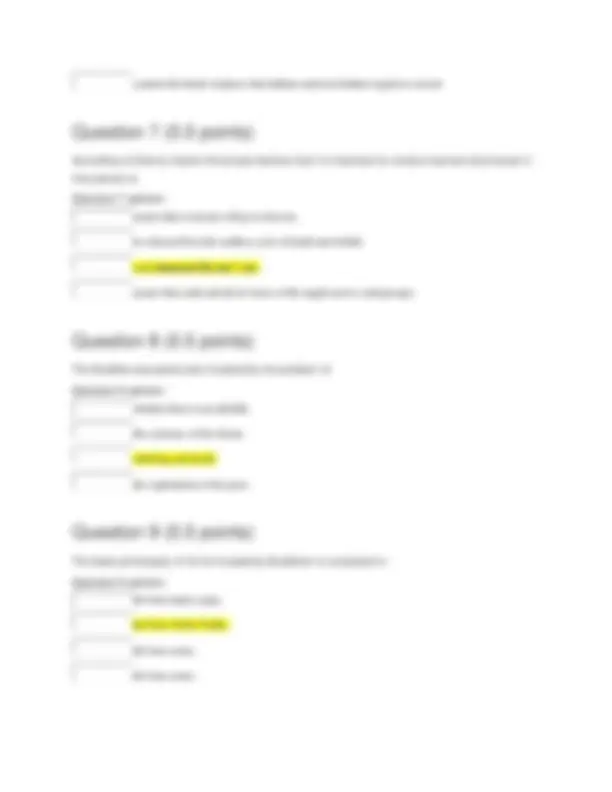
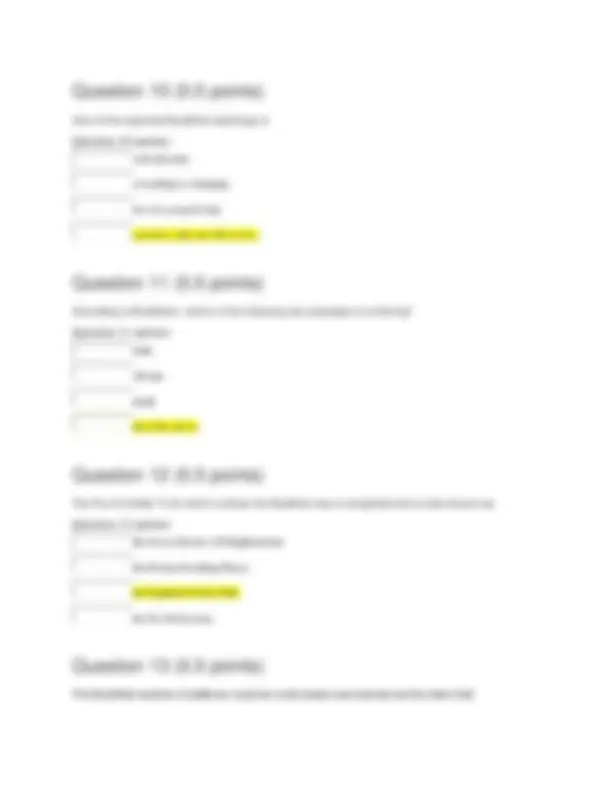
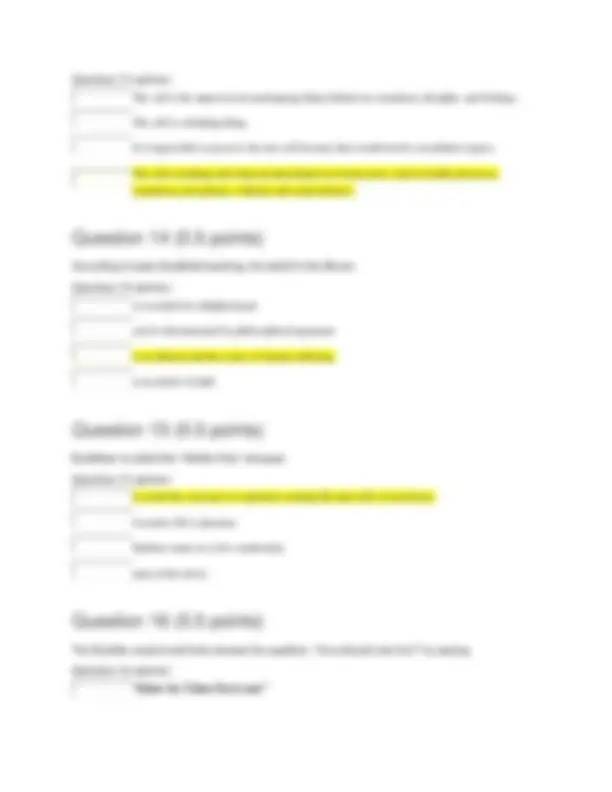
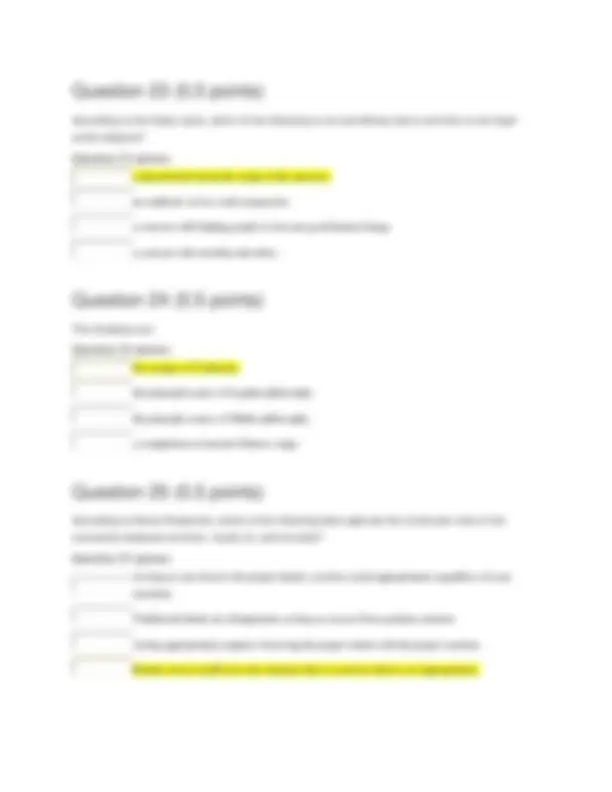
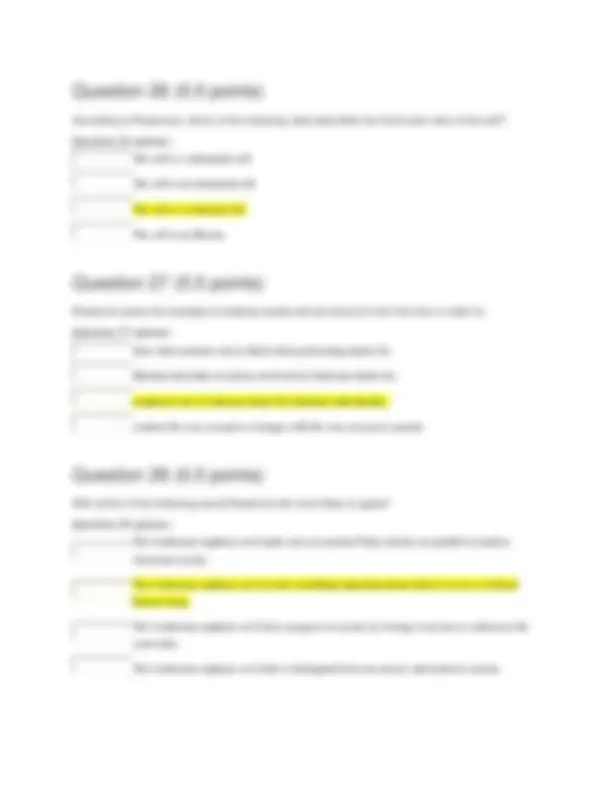
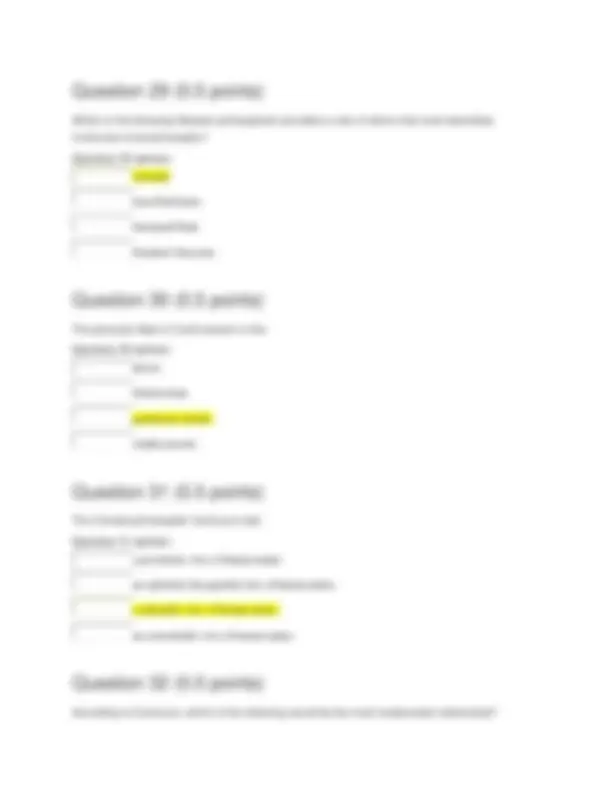
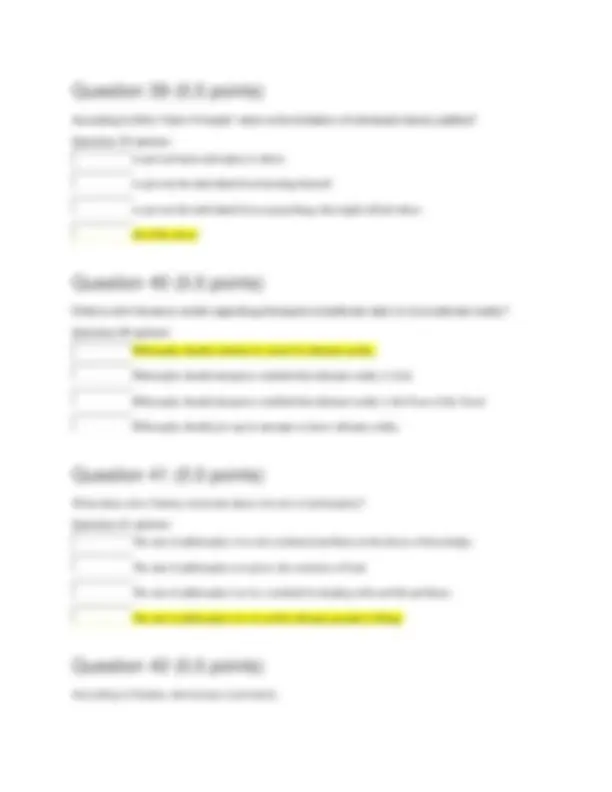
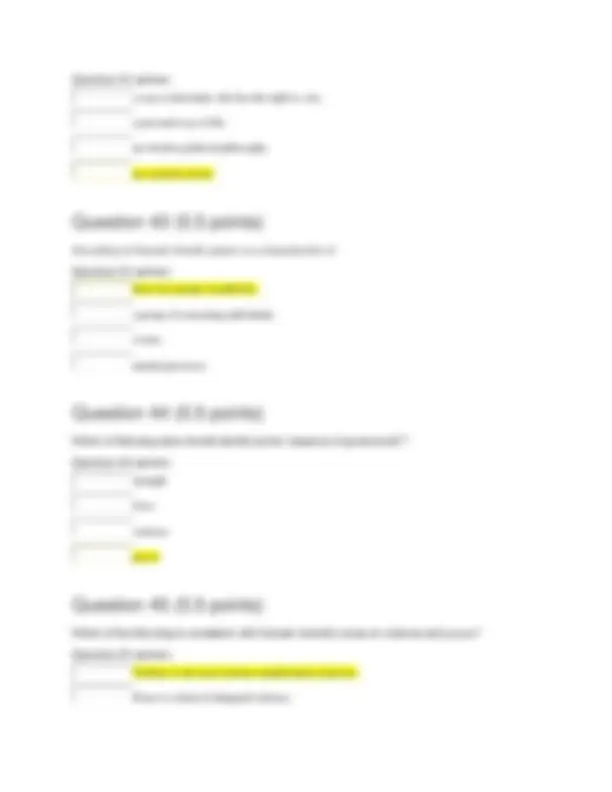
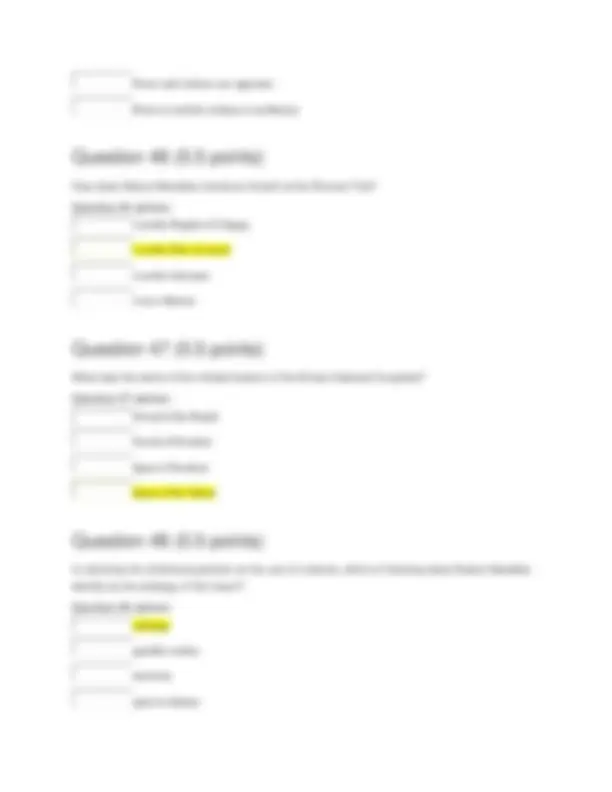
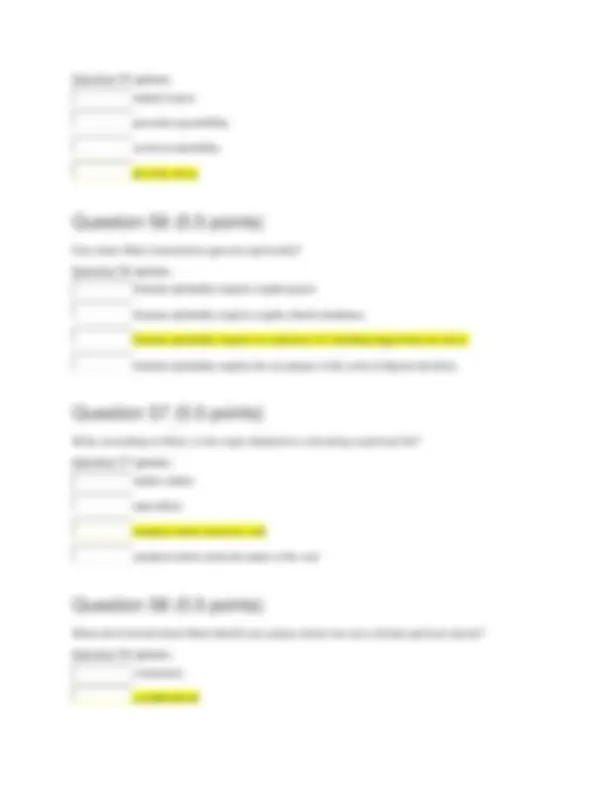
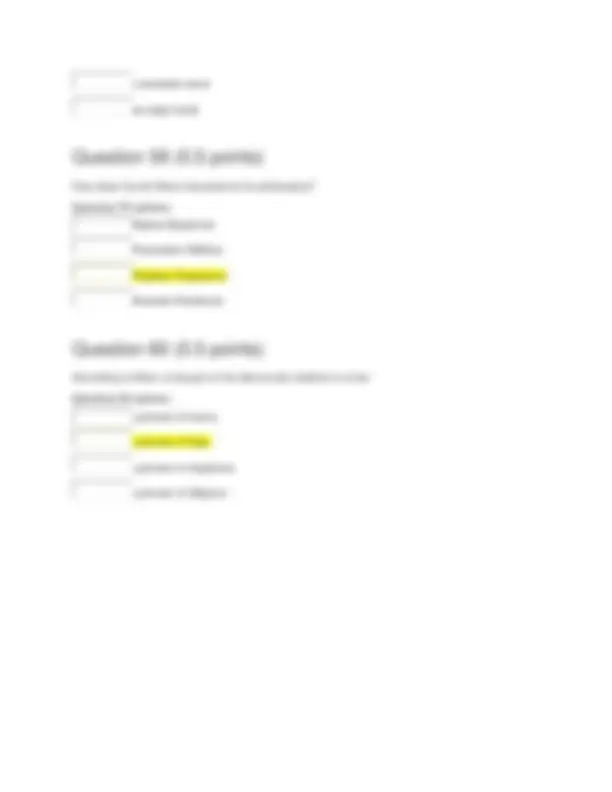


Study with the several resources on Docsity

Earn points by helping other students or get them with a premium plan


Prepare for your exams
Study with the several resources on Docsity

Earn points to download
Earn points by helping other students or get them with a premium plan
Community
Ask the community for help and clear up your study doubts
Discover the best universities in your country according to Docsity users
Free resources
Download our free guides on studying techniques, anxiety management strategies, and thesis advice from Docsity tutors
PHILOSOPY EXAM QUESTION AND ANSWERS 100% CERTIFIED ANSWERS
Typology: Exams
1 / 19

This page cannot be seen from the preview
Don't miss anything!












What is the study of fundamental reality?
Metaphysics Epistemology Axiology Logic
What is the study of the nature, sources and scope of knowledge?
Metaphysics Epistemology Axiology Logic
What is the study of value?
Metaphysics Epistemology
Axiology Logic Question 4 (0.5 points) What is the study of reasoning and argument?
Metaphysics Epistemology Axiology Logic Question 5 (0.5 points) According to Vine Deloria, Jr. many people do not understand Native American religion because they fail to see that Native American religion stresses:
the importance of true religious beliefs. the importance of religious arguments. the importance religious authority the importance of sacred places. Question 6 (0.5 points) For each type of sacred land, Deloria gives examples from non-Indian traditions, for example, from the Bible, in order to:
help non-Indians understand the kind of sacredness involved in each type of land. argue that non-Indians are incorrect about which lands are sacred. argue that whether a certain place is sacred is simply a matter of opinion.
Question 10 (0.5 points) One of the essential Buddhist teachings is:
seek pleasure. everything is changing. live for yourself only you have only one life to live. Question 11 (0.5 points) According to Buddhism, which of the following are examples of suffering?
birth old age death all of the above Question 12 (0.5 points) The Fourth Noble Truth which outlines the Buddhist way to enlightenment is also known as:
the Seven Factors of Enlightenment the Divine Dwelling Places. the Eightfold Noble Path. the Six Perfections. Question 13 (0.5 points) The Buddhist doctrine of anātman could be most closely summarized as the claim that:
The self is the unperceived, unchanging thing behind our sensations, thoughts, and feelings. The self is a thinking thing. It is impossible to perceive the true self because that would involve an infinite regress. The self is nothing more than an interrelated set of processes, such as bodily processes, sensations, perceptions, volitions and consciousness. Question 14 (0.5 points) According to basic Buddhist teaching, the belief in the ātman:
is essential for enlightenment. can be demonstrated by philosophical argument is an illusion and the source of human suffering. is an article of faith. Question 15 (0.5 points) Buddhism is called the “Middle Way” because:
it avoids the extremes of a pleasure-seeking life and a life of asceticism. it teaches life is pleasure. Brahma wants us to live moderately. none of the above Question 16 (0.5 points) The Buddha would most likely answer the question: “How should one live?” by saying:
“follow the Yellow Brick road.”
relativism. Question 20 (0.5 points) The Dalai Lama is regarded as the leader of:
Zen Buddhists. Tibetan Buddhists. Theravada Buddhists. Pure Land Buddhists. Question 21 (0.5 points) Which of the following best characterizes the Dalai Lama’s views regarding religion?
Differing core religious beliefs regarding the nature of reality, God and salvation are incompatible, so only one way can be the true way. There is one divine reality and that this one divine reality can be encountered in many different ways in many different religions. Thus, all religions are one. Religions are not all one but they are all equally valid paths to salvation. none of the above Question 22 (0.5 points) The Dalai Lama presents an argument to defend religious pluralism by comparing religion to:
a mansion with many rooms. medicine. an ark. an endless journey.
Question 23 (0.5 points) According to the Dalai Lama, which of the following is not something that is common to all major world religions?
a shared belief about the origin of the universe. an emphasis on love and compassion a concern with helping people to become good human beings a concern with morality and ethics Question 24 (0.5 points) The Analects are:
the sayings of Confucius. the principal source of Legalist philosophy. the principle source of Mohist philosophy. a compilation of ancient Chinese songs. Question 25 (0.5 points) According to Henry Rosemont, which of the following best captures the Confucian view of the connection between emotion, rituals (li), and morality?
As long as you observe the proper rituals, you have acted appropriately regardless of your emotions. Traditional rituals are unimportant, as long as you act from genuine emotion. Acting appropriately requires observing the proper rituals with the proper emotion. Rituals exist to instill in us the emotions that we need in order to act appropriately.
Question 29 (0.5 points) Which of the following Western philosophers provides a view of ethics that most resembles Confucian moral philosophy?
Aristotle Jean-Paul Sartre Immanuel Kant Friedrich Nietzsche Question 30 (0.5 points) The personal ideal of Confucianism is the:
doctor. businessman. gentleman-scholar. simple peasant. Question 31 (0.5 points) The Chinese philosopher Confucius had:
a pessimistic view of human nature. an optimistic but guarded view of human nature. a rationalist view of human nature. an existentialist view of human nature. Question 32 (0.5 points) According to Confucius, which of the following would be the most fundamental relationship?
the relationship between sisters. the relationship between friends. the relationship between mother and daughter. the relationship between father and son. Question 33 (0.5 points) According to Confucius, the virtue of filial piety means:
doing what is appropriate to a situation. love of education. devotion to one’s family, especially to one’s parents. doing only what is spontaneous. Question 34 (0.5 points) The Daodejing is known for its:
deliberate and mysterious obscurity. careful and analytical prose. logical organization of themes. mention of important sites in China. Question 35 (0.5 points) From a Daoist perspective, the proper job a person should have would be determined by:
whatever his or her family decides. the caste she or he belongs to.
Question 39 (0.5 points) According to Mill’s “Harm Principle” when is the limitation of individual’s liberty justified?
to prevent harm and injury to others. to prevent the individual from harming himself. to prevent the individual from saying things that might offend others. all of the above Question 40 (0.5 points) What is John Dewey’s verdict regarding philosophy’s traditional claim to know ultimate reality?
Philosophy should continue its search for ultimate reality. Philosophy should attempt to establish that ultimate reality is God. Philosophy should attempt to establish that ultimate reality is the Form of the Good. Philosophy should give up its attempts to know ultimate reality. Question 41 (0.5 points) What does John Dewey conclude about the aim of philosophy?
The aim of philosophy is to solve technical problems in the theory of knowledge. The aim of philosophy is to prove the existence of God. The aim of philosophy is to be a method for dealing with real-life problems. The aim of philosophy is to reveal the ultimate ground of Being. Question 42 (0.5 points) According to Dewey, democracy is primarily:
a way to determine who has the right to vote. a personal way of life. an obsolete political philosophy. an external system. Question 43 (0.5 points) According to Hannah Arendt, power is a characteristic of:
those few people in authority. a group of consenting individuals. events. natural processes. Question 44 (0.5 points) Which of following does Arendt identify as the “essence of government”?
strength force violence power Question 45 (0.5 points) Which of the following is consistent with Hannah Arendt’s views on violence and power?
Violence is the most extreme manifestation of power. Power is a kind of mitigated violence.
Question 49 (0.5 points) Which of the following actions does Mandela recommend to eliminate poverty among the South Africans?
better education for South Africans elimination of the “color-bar” that reserves the better jobs for whites elimination of laws that prohibit Africans from forming labor unions all of the above Question 50 (0.5 points) According to Martin Luther King Jr., how should those who are oppressed engage in the struggle against injustice?
They should wait patiently and adjust themselves to the oppressive situation. They should wait patiently and pray to God to change the oppressive situation. They should pursue the path and practice of nonviolent resistance. They should engage in a violent overthrow of the oppressive government. Question 51 (0.5 points) According to Martin Luther King, Jr. which of the following is required before taking the direct action of civil disobedience?
collection of the facts to determine whether there are injustices negotiation self-purification all of the above
Question 52 (0.5 points) Which of the following is not consistent with King’s views regarding civil disobedience?
One can disobey an unjust law since an unjust law is no law at all. One who practices civil disobedience should be willing to go to jail. One who practices civil disobedience should refuse to go to jail. One who practices civil disobedience should respect the legitimacy of just laws. Question 53 (0.5 points) What does King mean when he says we should reject the “myth of time”?
We must reject the idea that if we wait and pray, time with solve our problems. We must reject the story that God created time because it is a myth. We must reject time because it is an illusion. We must reject past philosophies as mere “myths” of ancient times. Question 54 (0.5 points) Which of the following are counted among Cornel West’s accomplishments?
philosopher and social activist hip-hop artist acting roles in The Matrix Reloaded and The Matrix Revolutions all of the above Question 55 (0.5 points) According to West, a thriving democracy requires:
a mountain retreat an empty beach Question 59 (0.5 points) How does Cornel West characterize his philosophy?
Radical Skepticism Postmodern Nihilism Prophetic Pragmatism Romantic Polytheism Question 60 (0.5 points) According to West, to be part of the democratic tradition is to be:
a prisoner of reason. a prisoner of hope. a prisoner of skepticism. a prisoner of diligence.